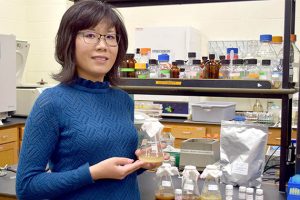
March 10, 2023
Mizzou Engineering researcher helps turn food wastes into biodegradable plastics
A Mizzou Engineer is helping researchers at Virginia Tech develop a process to convert food wastes into biodegradable plastics. Caixia “Ellen” Wan is an associate professor of chemical and biomedical Engineering and a bioprocess engineer. She’s part of a team that received a $2.4 million grant from the U.S. Department of Agriculture (USDA) to upscale bioplastic production with the goal of replacing petroleum-based plastics while also keeping leftovers out of landfills.
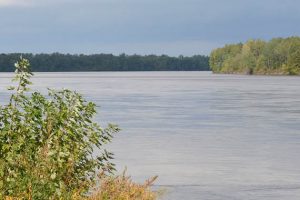
March 1, 2023
Missouri Water Center works to monitor water quality, quantities; train students
When it comes to water, there are a lot of stakeholders. Not only do we all need access to clean water—including fish and wildlife—but local economies rely on lakes and rivers for agriculture and tourism. When there’s not enough, droughts can destroy a year’s worth of crops. Too much can cause flooding that devastates communities. With those factors in mind, Mizzou established the Missouri Water Center a year ago, merging two former centers.

Feb. 9, 2023
Wear and forget: an ultrasoft material for on-skin health devices
Zheng Yan and a team of researchers at the University of Missouri may have a solution. They have created an ultrasoft “skin-like” material — that’s both breathable and stretchable — for use in the development of an on-skin, wearable bioelectronic device.
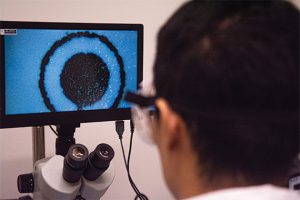
Dec. 7, 2022
Mizzou Engineering researchers design new heart health wearable device
A team of Mizzou Engineering researchers are using a $2.6 million grant from the National Institutes of Health (NIH) to help create a breathable material — with antibacterial and antiviral properties — to support the team’s ongoing development of a multifunctional, wearable heart monitor.

Nov. 10, 2022
Team using fluorescent molecules as biomarkers to study secretion
An interdisciplinary research team received NSF funding to develop a method to follow biological activity using fluorescent molecules

Sep. 27, 2022
In pursuit of better lithium-ion batteries
MU researchers Matthias J. Young (left) and Xiaoqing He are using a $500,000 grant from NSF to explore a key technical challenge preventing lithium-ion batteries from achieving optimal energy performance. By Eric Stann | MU News Bureau From personal electronics to electric vehicles, lithium-ion batteries are used in many technologies today. Over the last 30 years, scientists have worked to improve the overall safety and performance of these batteries by converting a key component, called electrolytes, from liquid to solid — partly due to an issue of the liquid being flammable. Yet, while solid-state lithium-ion batteries — using solid electrolytes…

Aug. 25, 2022
Building polymers one molecule at a time
A Mizzou Engineering researcher has demonstrated a new method of controlling material behavior by building polymers molecule-by-molecule. Polymers are made of long, repeating chains of single molecules known as monomers. In this study, Matthias Young — an assistant professor of biomedical, biological and chemical engineering — focused on monomers that exhibit high electrochemical capabilities, making them good candidates to serve as electrode materials for energy storage. Young and others have previously demonstrated that they could grow inorganic films onto carbon electrodes to make fast-charging batteries and supercapacitors, through a process known as atomic layer deposition. However, scaling up…
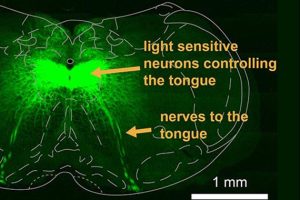
Aug. 22, 2022
Interdisciplinary team uses light as an innovative treatment to prevent tongue weakness in ALS
An interdisciplinary research team at Mizzou is investigating a novel treatment to prevent tongue muscle degeneration and preserve swallowing function in patients suffering from ALS (amyotrophic lateral sclerosis).
Aug. 8, 2022
Mizzou Engineers develop new method to design semiconductors
A new way to make semiconductors:Topology (A) and phase (B) imagery of the functionalized zone after zinc oxide atomic layer deposition. Mizzou Engineers have come up with a novel new technique to design semiconductors, the chips that make your phones, laptops and other devices not only smart, but also compact. Matthias Young and Matt Maschmann outlined a proof of concept for their technique in a recent issue of Nano Select and worked with the Technology Advancement Office to file an application to patent the work. Now, they’re hoping to scale up and optimize the process to make…
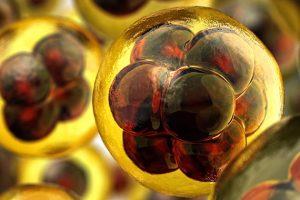
July 25, 2022
BBCE Spring 2022 Capstone Projects
Seniors in the Department of Biomedical, Biological and Chemical Engineering conclude their coursework with a semester-long capstone project. Through these capstones, students apply their classroom learning to develop prototypes to solve real-world issues.